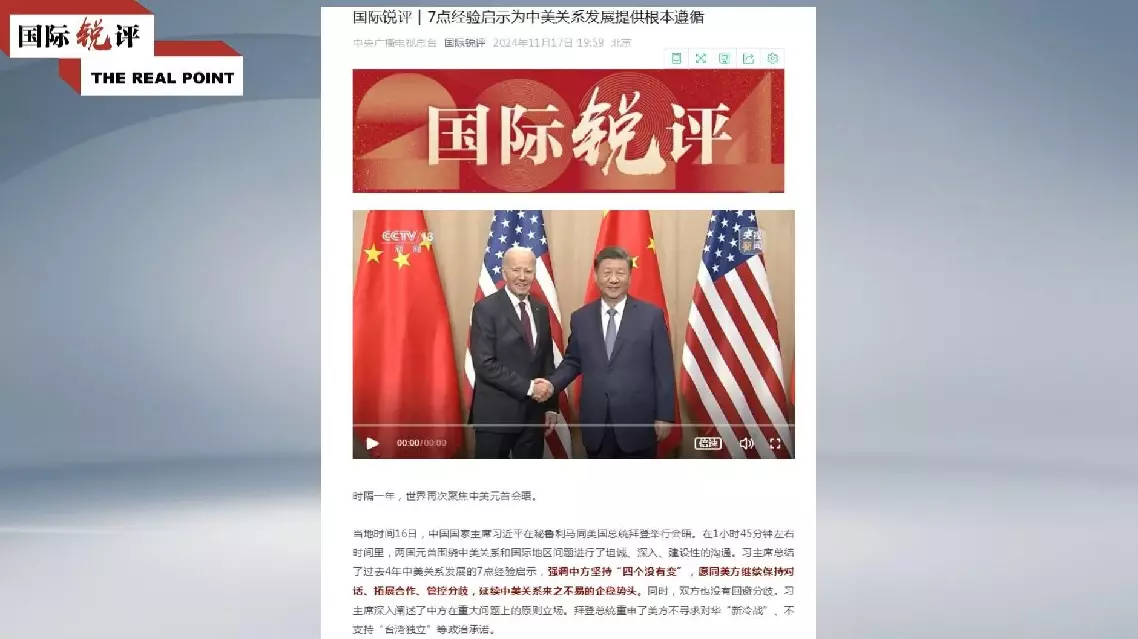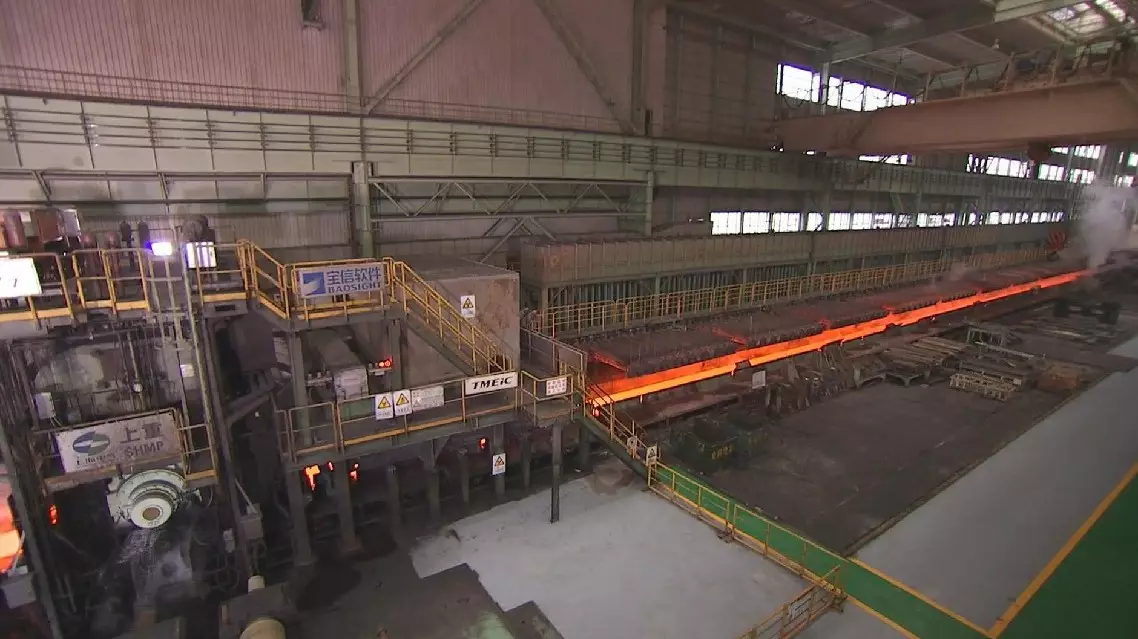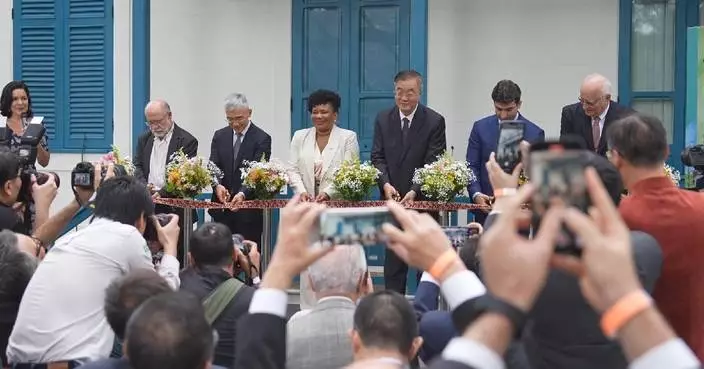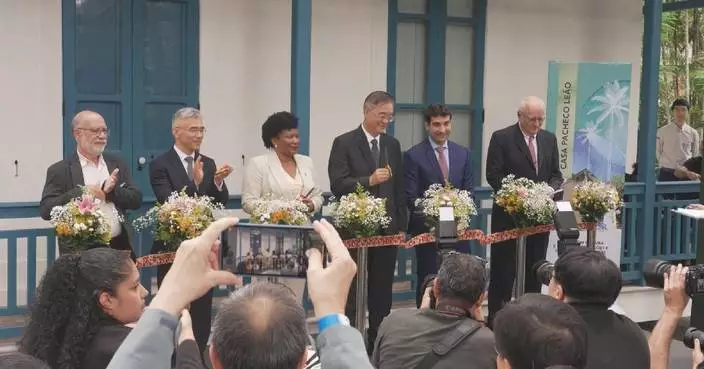The seven experiences and inspirations summarized by Chinese President Xi Jinping at a recent meeting with his U.S. counterpart Joe Biden serve as the fundamental guidance for the future development of China-U.S. relations, according to a commentary released by the China Media Group (CMG) on Sunday.
An edited English-language version of the commentary is as follows:
Xi and Bide held talks on bilateral relations on Saturday on the sidelines of the 31st APEC Economic Leaders' Meeting in Lima, Peru. The world once again turned its attention to the meeting between the leaders of China and the United States, two major countries in the world.
At the meeting, the two heads of state engaged in candid, in-depth, and constructive talks on China-U.S. relations as well international and regional issues of mutual interest.
President Xi summarized seven experiences and inspirations from the development of China-U.S. relations over the past four years, emphasizing that China remains committed to the "four consistencies" in its policy on the bilateral ties.
He said China is ready to engage in dialogue, expand cooperation, and manage differences with the United States so as to sustain the hard-won momentum toward the stable development of China-U.S. relations.
At the same time, the two sides did not shy away from differences between the two countries.
President Xi made China's principled positions crystal clear on China's core interests and major concerns, while President Biden reaffirmed U.S. political commitment not to seeking a "new Cold War" with China, and not to supporting "Taiwan independence."
In terms of timing, this meeting between the two heads of state coincides with the transition period of the U.S. government.
China has adopted a strategic, coherent, and highly responsible approach to its policy towards the United States, demonstrating its sincerity and efforts to work with the United States to contribute to the mansion of China-U.S. relations.
Professor Li Haidong from China Foreign Affairs University (CFAU), told the China Media Group (CMG) that at this critical juncture of China-U.S. relations, China hopes that the Biden administration will maintain the stability in its policy towards China.
Furthermore, China urges the new U.S. government to fully understand its principles, propositions, and bottoms lines regarding China-U.S. relations. China also calls on the United States to adopt a rational policy towards China to ensure that bilateral relations progress along a stable and predictable trajectory.
Over the past four years, China-U.S. relations have gone through ups and downs, and the bilateral relations have remained stable on the whole.
More than 20 communication mechanisms have been restored or established, with positive outcomes made in such areas as diplomacy, security, economy, trade, military, counternarcotics and people-to-people exchanges.
To consolidate the mansion of China-U.S. relations, China has initiated a series of proposals, including upholding mutual respect, peaceful coexistence and win-win cooperation as principles for handling China-U.S. relations to add building blocks to the dome, foundation and pillars of the mansion.
In Lima, capital of Peru, President Xi insightfully summarized seven experiences and inspirations for the future development of China-U.S. ties, namely to develop a correct strategic perception, match words with actions, treat each other as equals, not to challenge red lines and paramount principles, conduct more dialogue and cooperation, respond to the expectations of the people, and show responsibility as a major country.
The experiences and inspirations, drawn from the course of the development of relations between the two countries over the past 45 years, involve key issues such as how the United States should view China, how the United States should treat each other, How the United States should manage differences and jointly shoulder global responsibilities, charting the direction for the future development of bilateral relations.
The perception of whether China and the U.S. are "rivals" or "partners" is fundamental to the foundation of the bilateral relations.
Over the past 45 years since the establishment of diplomatic ties between the two countries, regardless of the changing international landscape, China's policy towards the United States has remained consistent that the two countries should treat each other as partners, rather than rivals, should help each other succeed rather than inflict harm on each other, should seek common ground while shelving differences, rather than seek vicious competition.
China advocates these principles and practices it as well.
At the meeting, President Xi stressed that China's goal of a stable, healthy and sustainable China-U.S. relationship remains unchanged; its commitment to mutual respect, peaceful coexistence and win-win cooperation as principles for handling China-U.S. relations remains unchanged; its position of resolutely safeguarding China's sovereignty, security and development interests remains unchanged; and its desire to carry forward the traditional friendship between the Chinese and American peoples remains unchanged.
This demonstrates China's sense of responsibility and mission in safeguarding the fundamental interests of both peoples and promoting world peace and development, embodying the responsibilities of a major country.
In contrast, some politicians in the United States have been clinging to the Cold War mentality, wrongly positioning China as the "biggest strategic competitor" and seeking to build "small yards with high fences" and advocate decoupling and disruption of industrial and supply chains. The past few years have seen China-U.S. relations at a low ebb since the establishment of diplomatic ties.
Facts have proven time and again the truth that China and the United States gain from cooperation and lose from confrontation. It is completely unfeasible for the United States to suppress China based on its so-called "position of strength". Instead, it would damage its own interests and exacerbate the conflicts and confrontations in the world.
It also serves as a warning to the U.S. side that only by abandoning the zero-sum game mentality and developing a correct strategic perception of China, can the "first button" of China-U.S. relations be put right.
Some politicians in the United States also said that "guardrails" should be added to China-U.S. relations. What are exactly the most important guardrails and safety nets for China-U.S. relations? President Xi made it very clear this time.
"The one-China principle and the three China-U.S. joint communiques are the political foundation of China-U.S. relations that must be abided by. The Taiwan question, democracy and human rights, China's path and system, and China's development right are the four red lines for China, which must not be crossed and challenged."
At the same time, China also clarified its positions on specific issues on Taiwan, trade and technology, cyber security, the South China Sea, the Ukrainian crisis and the Korean Peninsula, and clearly demanded that the United States respect the development rights of the Chinese people.
Analysts say that these statements serve as a stern warning to the United States that it cannot unilaterally demand that China cooperate in managing differences, and the United States should treat each other equally and truly respect China's core interests. Once China's red lines are crossed, the underpinning for the mansion of China-U.S relations will greatly tremble.
As the most important bilateral relationship in the world, the development of China-U.S. relations bears the future and destiny of the mankind, on which the two heads of state have a high degree of consensus. At the meeting, the two heads of state, for the first time, confirmed the need to respond to the risks of artificial intelligence systems, reaffirming that the need to maintain human control over the decision to use nuclear weapons.
All these show that China and the United States shoulder special responsibilities in maintaining world peace and promoting common development, and should bring certainty and positive energy to this volatile and unstable world.
The vast expanse of the Earth is big enough to accommodate the respective development and common prosperity of China and the United States, said President Xi in his meeting with U.S. Secretary of State Antony Blinken in Beijing in June last year.
Under the strategic guidance of the two heads of state, the progress made in China-U.S. relations is hard-won and worth cherishing together. In two months, the United States will usher in a new government.
It is hoped that the two sides will uphold the principles of mutual respect, peaceful coexistence, and win-win cooperation, and take the seven experiences and inspirations summarized by President Xi as an guidance for achieving a smooth transition in China-U.S. relations, and find a right way for China and the United States to get along with each other in the new era so as to benefit both countries and the world.

Xi's comments serve as fundamental guidance for future development of China-US ties: commentary









